























OnahNwachukwu Editor, THEWILL DOWNTOWN




Uzor Arukwe is a talented Nigerian actor who is fast becoming a household name known for his energetic and versatile performances in film and television. Arukwe is known to be able to portray various characters, from love interests to comedy and intense dramatic roles. He has become a beloved character in Nollywood by his ability to absorb any character into himself. He believes that although method acting is good, it is not the best, as many actors have gone on to win Oscars, and they didn’t use method acting. Known as the dark horse, his dream role would be one in the ghetto.
“Absolutely, I have a dream role. It is a type of role that is a major ghetto story; I would love that very much. I would also like to become a film executive, you know, produce or direct your own movie.”
Uzor Arukwe’s story makes for a fascinating read. Scroll to pages 8 through 10 for his story.
Making a statement as a true fashionista can be achieved by correctly accessorising your dress. Whether you are going to a wedding or dinner, accessories add style to your ensemble. Our fashion pages show you how to accessorise your dress like a pro. That’s on pages 4 and 5.
Our movie reviewer spotlights Beetlejuice Beetlejuice; this sequel is a trip down memory lane packed with nostalgic elements for fans of the original. According to the review, it’s a fun movie, so I will watch it soon. I urge you to read the review on page 16 and decide for yourself if you will see the film.
Don’t forget to click on the instructions below the QR codes to download the playlist curated just for you.
Until next week, enjoy your read.










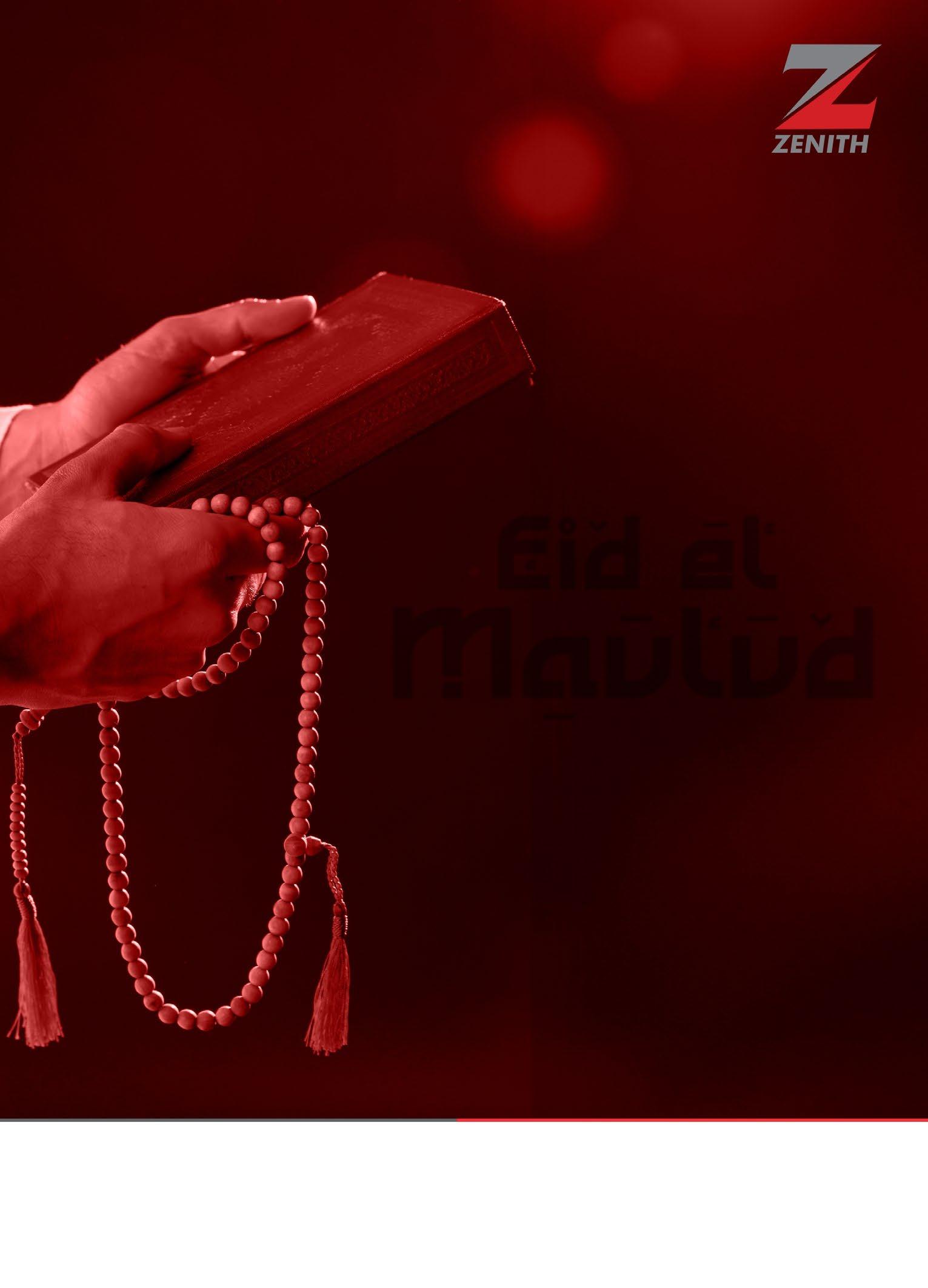





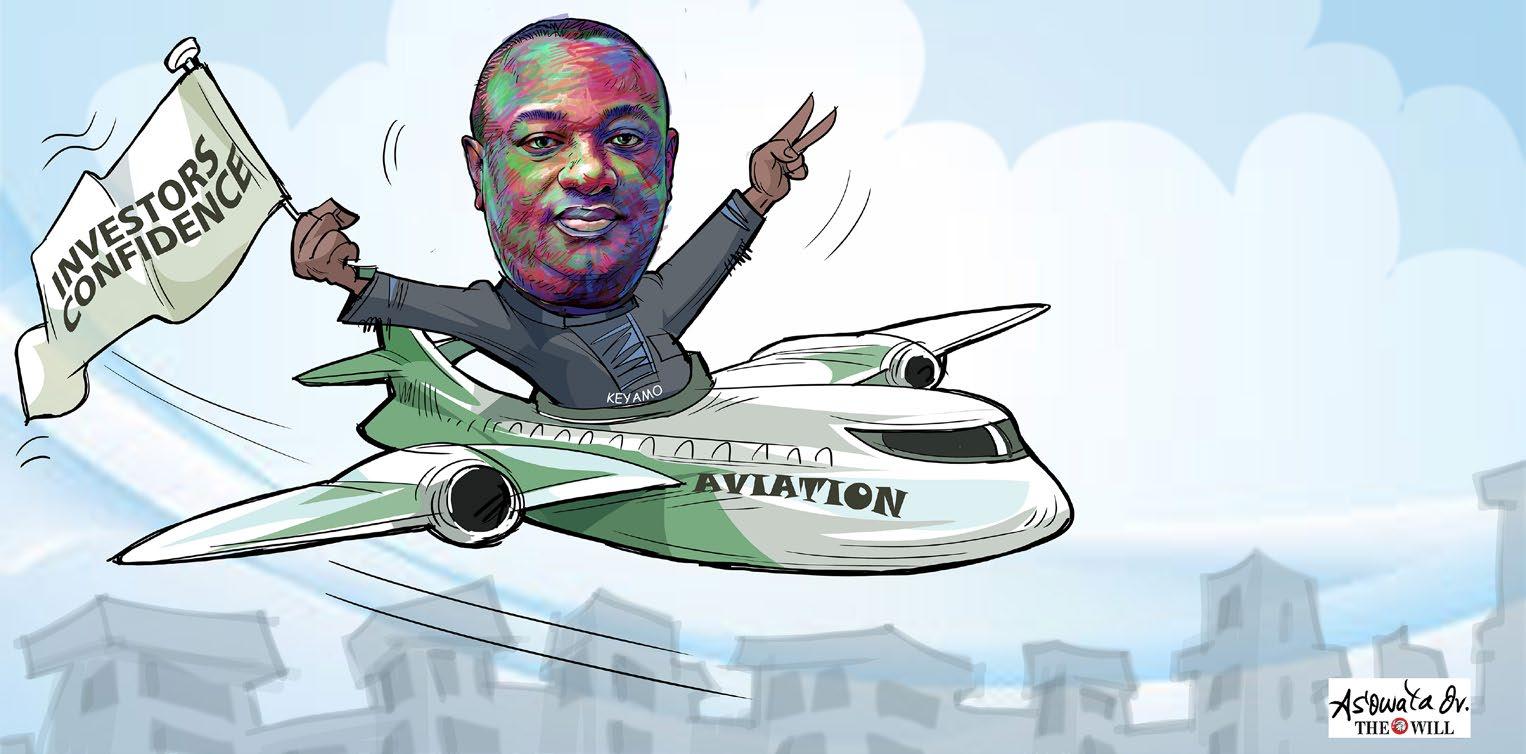
l Domestication Cuts Cost For Airline Operators l Air Peace, Others to Pay Less to Acquire Planes, Insurance l Price of Tickets to Drop l Tinubu, Keyamo
BY ANTHONY AWUNOR
The Nigerian aviation sector gained global altitude last Wednesday when the country signed the Cape Town Convention, CTC, and by that act became one of the few countries in the world to pioneer the issuance of Practice Directions by the Federal High Court, which is vested with the constitutional jurisdiction on aviation.
A remarkable feat by the Bola Tinubu administration pursued doggedly by the Minister of Aviation and Aerospace Development, Festus Keyamo, SAN, the signing will significantly reduce the cost of operation for Nigerian operators. The primary aim of the convention and the protocol is to resolve the problem of obtaining certain and opposable rights to high-value aviation assets, namely airframes, aircraft engines and helicopters which, by their nature, have no fixed location as defined by the International Civil Aviation Organisation, ICAO.
"If you read the actual Practice Direction, you’ll discover they contain many promises, such as reduced insurance costs, increased investor confidence, improved access to aircraft financing, and enhanced dispute resolution,” President of the Aircraft Owners and Pilots Association of Nigeria and former CEO of Associated Airlines, Alex Nwuba, said while appraising the formal adoption of the CTC in the country.
"Starting with insurance cost, insurance is more than law and beyond promises; it is the management of risk. To begin with, what is the airport rating? What are the chances that someone will not climb over the airport fence and introduce a foreign object into the aircraft? What is the state of security at the premises? What is the perception of the regulator and his capacity to handle safety and prevent accidents?
“Practice guidelines are a tiny part of the risk assessment to reduce rates, but they help. Then, we look at investor confidence. Is it based on the state of practice direction or the economy? Do we have dollars and pounds for leases or special provisions for the industry's forex? What guarantees are available, even for export credit loans? How stable is the polity, etc.? Then, we ask how these things integrate to improve investor confidence, which is the basis of the effort.
"Finally, regarding dispute resolution. It is essential to point out that though the Cape Town Convention Practice Direction is only a framework that does not specify a specific dispute resolution mechanism, it however offers guidance on how such disputes should be handled, as is already found in existing contracts. It also defines the remedies available to parties involved in a dispute, such as the applicable law, jurisdiction, and procedures," he added. According to him, this insight
into the CTC's role in the aviation industry is crucial for all stakeholders to understand.
Arguing that though Nigeria has been a signatory to the CTC since 2001 and only domesticated the convention by last Wednesday’s action, thus ensuring that beneficiaries fully enjoy the intended benefits without any ambiguity, Nwuba applauded the Minister of Aviation and Aerospace, Mr Festus Keyamo, a Senior Advocate of Nigeria, for taking this bold step towards addressing the broad questions facing the country’s aviation industry.
"I am sure that everyone who has signed any lease and finance contracts in over a decade has incorporated the terms of the CTC into the agreement, yet we talk about the challenges institutions face during conflict and resolution,” he said.
Examining the essence of the CTC further, Nwuba stated that problems which primarily arise from legal systems with different approaches to securities, title retention agreements and lease agreements, creates uncertainty for lending institutions, regarding the efficacy of their rights. This hampers the provision of financing for such aviation assets and increases the borrowing cost.
“This document will create specific conditions to enforce the
terms of the legal agreement, which will not vary in substance from current agreements but hopefully will now give it more teeth," he noted.
EXPERTS, INVESTORS, OFFICIALS CELEBRATE CTC DEAL
Investors, experts and government officials are on the same page about the immediate and real positive impact of the signing of the CTC on the restoration of investors’ confidence in the nation’s aviation sector. This was the message conveyed by their presence at the signing into law of the CTC Practice Directions by the Chief Judge of the Federal High Court, Justice John Terhemba Tsoho, during a stakeholders’ meeting of the Presidential Enabling Business Environment Council (PEBEC) chaired by Vice President Kashim Shettima at the Presidential Villa, Abuja, last week.
Stanley Nkwocha, Senior Special Assistant to the President on Media & Communications (Office of The Vice President), said before now some local operators had, in the past, breached the Cape Town Convention, which regulates aircraft leasing across the world, leading to the Aviation Working Group, co-chaired by Airbus and Boeing, saying Nigeria would be blacklisted until it implements a law that would guide against a repeat of such breach.
“It is a great day for the Nigerian nation. We had fruitful engagements and we were able to cross-pollinate ideas across all sectors and have come up with robust solutions to the challenges facing the aviation industry,” said Vice President Kashim Shettima, at the event, witnessed by Allen Onyema, the Chairman and Chief Executive Officer of Air Peace and Alhaji Abdulmanaf Yunusa Sarina, the Chairman of Azman Airlines, Mr. Wale Edun, the Minister of Finance and Coordinating Minister of the Economy, Dr. Jumoke Oduwole, Special Adviser to the President on Presidential Enabling Business Environment Council (PEBEC) and Investment, Dr. Anastasia Gbem, the Aviation Ministry’s Director of Human Resources, who represented the Minister, Keyamo and Mr Olusegun Omoseye, the Chief Executive Officer of the National Insurance Commission of Nigeria.
On his part, Edun promised to meet with airline operators and other stakeholders to perfect issues pertaining to agreements reached at the meeting with the vice president.
He said: “My Lord, the CJ of the Federal High Court, called it action to revolutionise the airline industry. PEBEC is all about improving the business environment and reducing cost and what has been signed here is action that will substantially reduce cost in the airline industry, facilitate growth and development of that industry, and include further action that, I’m sure, would be taken in that direction once I meet with the airline industry and also have Customs present to discuss some charges which they want lowered, and which they believe by law should, in fact, have been implemented at lower levels.”
Speaking on behalf of Airline Operators of Nigeria (AON), Onyema, the Air Peace Chairman and CEO, said the convention will impact the aviation sector positively. He described the event as a revolution that would restructure the aviation sector for greatness globally. He said, “Today is a historic day for Nigeria. President Bola Ahmed Tinubu has once again demonstrated that he is not only a listening president but has gone a long way to engender the ease of doing business in the aviation industry more than any other since the creation of this country called Nigeria.
“We the airline operators are so happy and we commend him for what he has done today. Today is a revolution. President Bola Ahmed Tinubu has caused a positive revolution in the aviation industry by making sure of this practice direction concerning the Cape Town Convention and its application in Nigeria.”
the Federal High Court will eliminate judicial impediments in the implementation and compliance with the Cape Town Convention. To them, this singular move will obviously revolutionise airline business in Nigeria as it will boost investors’ confidence and open the floodgate to Nigerian air operators to have easy access to aircraft acquisition at much lower costs. According to them, such a move would also significantly enhance the growth of the aviation industry by creating more jobs and promoting the rapid economic development of the aviation industry. By doing so, they are of the opinion that the Nigerian aviation industry, which has a huge global market can favourably compete and increase its contribution to the Gross Domestic Products (GDP).
Despite being a signatory to the Cape Town Convention (CTC) since 2001, domesticated in the Civil Aviation Act 2006, as amended in the Civil Aviation Act 2022, Nigeria has not benefited from the convention, due to the fact that most airline operators in Nigeria, before now, were not complying with the requirements. In fact, the issue of aircraft lease had remained one of the major challenges to airlines in the country.
THEWILL investigation showed cases where operators went abroad and leased aircraft and returned to Nigeria. These operators refused to pay and hold on to the aircraft, thus creating a bad reputation for the Nigerian aviation market. There have been instances where an airline took some aircraft engines worth millions of dollars and never wanted to return them. There was another case in which a helicopter was seized by a creditor and the lessors had to fight for its release. In both instances, it took the intervention of the Nigeria Civil Aviation Authority NCAA to settle the dispute amicably.
Such sharp practices led to the blacklisting of Nigeria by the Aviation Working Group.
The AWG CTC compliance index shows Nigeria’s substantial non-compliance with the CTC which is largely as a result of legal impediments in the country’s judicial process that have had adverse impact on the implementation and compliance with terms of the convention.
Certain judicial cases, THEWILL gathered, have also shown that speedy reliefs sought by the creditors were not granted within the 10-day declaration made by Nigeria under the convention.
To bridge the gap and for local airlines to survive and keep afloat in their flight operations, Mr. Keyamo after extensive engagements with aircraft manufacturers and international lessors started chasing the domestication of the CTC Practice Direction which was eventually signed during the meeting of the Presidential Council of Presidential Enabling Business Environment Council (PEBEC) last week.
For a financier or lessor (each one a creditor), the virtues of the 2001 Cape Town Convention bring speed, certainty and cost savings to repossession, deregistration and export of aircraft, helicopters and aircraft engines (aircraft objects). This should be on insolvency or other default where the aircraft object is in a country whose laws would otherwise not be creditor-friendly.
The convention also protects creditors’ interests in aircraft objects by providing for the registration of “international interests” in those aircraft objects at a single, web-based, “International Registry” that is open 24/7; subjecting those interests to a simple priority regime.
For airlines and other aircraft operators, Cape Town’s virtues are that improved creditors’ rights can translate into better pricing. For example, airlines in states that have implemented Cape Town’s Alternative A insolvency regime, with a “waiting period” of 60 days, have achieved impressive pricing on their capital markets financings of aircraft. With better pricing, stakeholders have affirmed that such a good gesture would surely rub off on the price of ticketing, reduce flight delays and cancellations, increase flight frequencies and connectivity and ultimately ensure quality service delivery.
Commending Mr. Keyamo and the Ministry of Aviation and Aerospace Development for the landmark achievement, the Director of Research, Zenith Travel Consult, Mr Olumide Ohunayo, said the new CTC Practice directive is a game changer for the entire industry.
Ohunayo, who said the minister has done well, stated that the notoriety of the judiciary in matters affecting the aviation sector is what Keyamo has come out to address.
"Our judicial system has been notorious for granting irrational judgements. That is what the minister wants to address," he said.
He noted that this renewed effort by the minister will definitely cut down the cost of airline operation in Nigeria, reduce insurance expenses, make provision for more aircraft, increase flight services and ultimately create a better experience for travellers.
He said, "It is a good one for Nigerian airlines and congratulations to the Minister of Aviation, Mr Festus Keyamo. However, Nigeria signed the CTC some time ago, ratified and domesticated it, but our operators were always using the judiciary to circumvent that convention and that puts us in a bad light in the International community. It made things more difficult and more expensive.
"What the minister has done is to work with the government to use his position in the executive arm and his experience as a lawyer to make the judiciary understand the implications of that convention and promise not to intervene with the process of turning in leased assets to the owners. That gives confidence to the leasing companies. What had happened was that Nigerian operators were running to the courts to hold on to the aircraft that did not belong to them, knowing that they failed to meet up their financial obligations".
The aviation expert affirmed that the Minister of Aviation succeeded in saving the assets for the lessors so that the court will not hold on or intervene in such fake injunctions.
Ohunayo urged airlines to seize the opportunity of the convention and start fresh relationships with the lessors. He said the convention will bring down the leasing fee and insurance, as well as technical support.
“All these costs will come down and it will help the industry. There will be more aircraft, more flights and everybody will be happy,” he said.
He also asked the government to go further by licensing airline operators with smaller aircraft that can be used for shuttles to and from smaller and less viable airports. “The licensing of such a group of operators and lifting the ban on the age limit of aircraft is one area they should work on now. We should not tie our hands with an age limit ban, so that we can have different types of aircraft and grow short haul flights, cargo and other sectors of air transport operations,” he added.

Dr Jumoke Oduwole, disclosed that the signing of the document would help to reduce the cost of insurance as well as reduce the cost of doing business in the aviation sector and also impact passengers who had experienced a high cost of flight tickets lately, which was caused by a number of factors, including foreign exchange and others. For Dr Anastasia Gbem, the Aviation Ministry’s Director of Human Resources, the signing of the document on actualising the CTC was in line with the ministry’s goal of enhancing the capacity of local airlines’ business.
According to her, “Investors can bring their aircraft into Nigeria and if there is any problem, such aircraft would be recovered within the 10-day period that Nigeria and the Cape Town Convention have provided. So, it is an unprecedented history made today and it is a venture that will boost the Nigerian airlines and the entire aviation industry.”
A NEW DAWN
With this new development, aviation stakeholders are of the view that the Practice Directions issued by the Chief Judge of
We the airline operators are so happy and we commend him for what he has done today. Today is a revolution. President Bola Ahmed Tinubu has caused a positive revolution in the aviation industry by making sure of this practice direction concerning the Cape Town Convention and its application in Nigeria

In his submission, the former commandant of the Murtala Muhammed International Airport (MMIA), Lagos, Group Captain John Ojikutu (retired) welcomed the new development.
Group Capt Ojikutu however queried the nature of Federal Government’s commitment to private airlines’ default in payment. He also wondered about the nature of the FG commitment to the default of private airlines and the national/ flag Carrier defaults.
Stakeholders maintain that for the CTC to be fully operational, the risk factor has to be taken into consideration. Aviation, they contend, is a capital intensive sector that involves a lot of risk that will require closer collaboration with the insurance sector, thereby reducing risk and encouraging investment in the sector on the part of the aircraft lessors and lessees.
The Commissioner for Insurance /CEO National Insurance Commission (NAICOM) Mr Olusegun Ayo Omosehin, penultimate week, said there was a need to create such collaboration between the insurance and the aviation sector.


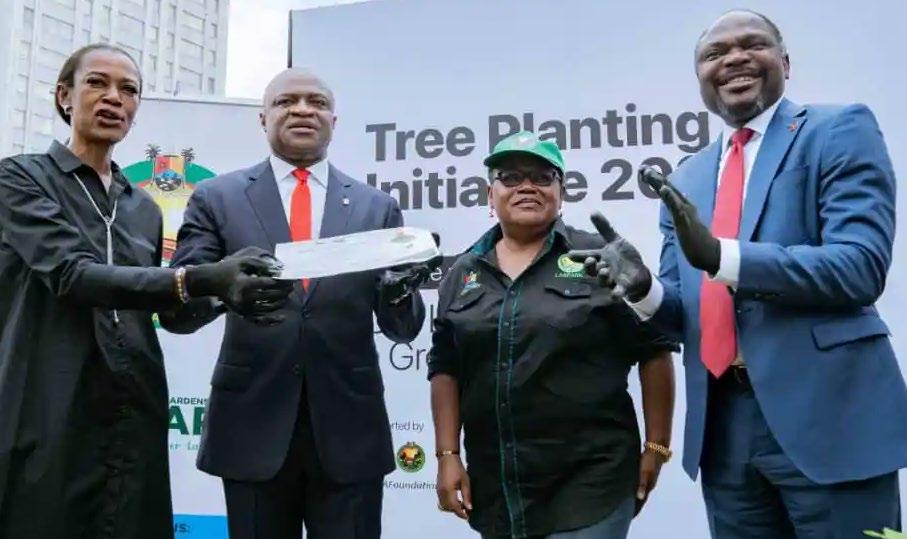
Senator Sumaila Commends Nigerian Troops For Neutralising Bandit Kingpin Halilu Sububu
The Senator representing Kano South Senatorial District, Sulaiman Abdulrahman Kawu Sumaila, has commended Nigerian troops for neutralising notorious bandit kingpin, Kachalla Buzu, aka Halilu Sububu, in Zamfara State.
In a statement issued to newsmen on Friday, Sumaila described the troops' action as a welcome development, saying the soldiers deserve commendation. He said the success recorded by the troops was not unconnected with the recent commitment exhibited by the Federal Government through the Federal Ministry of Defence and the Office of the National Security Adviser, Malam Nuhu Ribadu.
“Neutralisation of this bandit kingpin is something commendable. I want to use this opportunity to commend President Bola Ahmed Tinubu, the Minister of State for Defence, Bello Matawalle; National Security Adviser, Malam Nuhu Ribadu; Zamfara State Police Commissioner, Muhammad Shehu Dalijan, and above all, the Nigerian troops.
“Though the Nigerian troops have succeeded in neutralising Sububu, we need more efforts on their part to also neutralize the remaining bandits that are terrorizing our people in Zamfara, Katsina, Sokoto, Kebbi, Niger and Kaduna states. "We need all the bandits to either be neutralised or captured alive to end the banditry in the region," the lawmaker said.
He appealed to the Minister of State for Defence, Bello Matawalle, and all security agencies to "block all possible escape routes to prevent the bandits from escaping due to pressure from the troops in the five states of Zamfara, Kebbi, Sokoto, Kaduna and Niger”. “There are several communities that share borders, with the forests linking them with five states affected by banditry. My constituency is one of such places. So, the troops need to pay attention to such places so that the bandits will not have hiding places in such areas.
“I hope Mr President will continue to support the Nigerian troops to end this menace. Several people were killed in bandits' attacks, hundreds of communities sacked in the four affected states and hundreds of residents displaced. We want concerted efforts between the Federal Government and the four affected states to end banditry in the region,” he said.
Senator Sumaila also urged the people of the affected states to always cooperate with security agencies by availing them with useful information that will help in winning the fight against banditry in the region, noting that “the issue of security concerns everybody, hence the need for the society to contribute quota in the crusade”.
BY SAMPSON UHUEGBU
Worried by the continued intimidation of innocent citizens in the state by some security agencies, the chairman of the Police Community Relations Committee (PCRC), Imo State, Chima Chukwunyere, has called on the leadership of National Unions of Roads Transport Workers (NURTW), Imo State chapter, and other transport unions in the State, to rise against such anomaly.
In a letter captioned: "The Continuous Defiling of Ethics of The Profession", dated September 6, 2024, made available to newsmen in Owerri on Friday, and copied to Imo State Commissioner of Police, Director DSS and the Commander 34 Artillery Brigade, Obinze, the PCRC chairman advised the chairman of the NURTW, Imo State chapter and all motorist to resist the action of some of the security agencies to avoid the extortion of innocent youths.
He said, "I wish to draw the attention of your office and other transport unions in the state to the continuous defilement of the ethics of their profession by the security agencies in the state."
Chukwunyere reminded the union about the recent warnings by the Inspector General of Police (IGP) to security agencies in the country against intimidation of fellow citizens by way of collecting and having access to their mobile phones.
He said the government perceived these actions as illegal and a broad-day robbery using Federal Government uniforms.
“This act is not only peculiar to the Police alone, other security agencies such as the Joint Team of Security Force are also culprits."
The PCRC chairman disclosed that his attention as the chairman of the Imo Hoteliers Association was drawn recently by the complaints of members by their guests about the treatment meted out to them by security agencies in the state.
"Some of them even forcefully paid between N200,000 to N300,000 in order not to be tagged either IPOB, ESN members of 419 or Yahoo plus", he added.
PCRC vehemently condemned the way and idea of security agencies on patrol and roadblocks forcing the youths to come down from vehicles and asking drivers to leave with their vehicles in order for them to extort them.
Chukwunyere insisted that in the case of a driver observing this criminal action, such a driver should stop immediately and resist the security agencies and call the Police Emergency Security Numbers: 08034773600, or call PPRO 08148024755.
BY FELIX IFIJEH
After several delays, the federal government at the weekend reached an agreement with the management of Dangote Refinery on the commercial terms for the supply of crude oil to the refinery and the off-taking and distribution of petrol and diesel from the facility, starting today, Sunday.
The terms of the agreement would ensure that the distribution of petrol from the 650,000 barrels per day Lagos-Lekki Free Zone-based facility would start with an initial 25 million litres per day.
Unveiling the agreement in Abuja on Friday, the Executive Chairman of the Federal Inland Revenue Service (FIRS), Dr. Zacceus Adedeji, who represented the Minister of Finance and Chairman of the Presidential Committee on the Sale of Crude Oil and Refined Products for Domestic Consumption in Naira, Wale Edun, said that as part of the resolution, the Nigerian National Petroleum Company Limited (NNPC) would be the sole off-taker of petrol from Dangote Refinery while diesel from the facility would be sold directly to any interested marketer. He said that crude supplied to Dangote Refinery would be paid in naira and both petrol and diesel from the $20 billion refinery as well as all costs associated with the transactions would also be paid in the local currency.
Adedeji stated, “Supply of petrol exclusively to the Nigerian National Petroleum Company Limited NNPC while other refined products will be available to all marketers. This decision follows a briefing of the Presidential Committee on the sales of crude oil and refined products for domestic consumption in naira.
“I’m glad to announce that all agreements have been put in place and the loading of the first batch of PMS as already announced by NNPC will commence on Sunday, 15th September 2024. And from 1st of October, NNPC will commence the supply of crude oil to Dangote Refinery to be paid for in naira. In return, Dangote Refinery will supply PMS and diesel of equivalent value to the domestic market to be paid for in naira.
“Diesel will be sold in naira by Dangote Refinery to any interested off-taker. PMS will only be sold to NNPC. NNPC will then sell to various marketers for now. All associated regulatory costs -NPA, NIMASA, Federal Inland Revenue and all other Regulatory of fee that are associated with this transaction will be paid in naira.
“The technical committee that worked to flesh out this initiative, I mean this committee will transition to an implementation, Execution and Monitoring Committee that will be working out of the Lagos for the next three to six months.”

BY FELIX IFIJEH
This weekend’s governorship poll in Edo State started on a shaky note on Thursday when the Peoples Democratic Party (PDP) and its candidate in the September 21 governorship election in Edo State, Asue Ighodalo, have declined to sign the Peace Accord initiated by the National Peace Committee (NPC), led by former military Head of State, General Abdulsalami Abubakar (retd.) for the political parties and their candidates in the election.
Governor Godwin Obaseki had on Wednesday questioned the essence of a peace accord when, he claimed, an umpire showed bias and open support for the All Progressives Congress (APC), ahead of the build-up to the governorship poll.
Speaking when he received the Chairman of the NPC at the Government House in Benin City, the governor alleged that PDP members are being harassed and detained by the police in Edo State and Abuja.
He said, “The opposition party in the state, APC has always argued that they may not be as popular and didn’t win in the last election, but however promised to use federal might to determine the outcome of the forthcoming election.
"We thought it’s just rhetoric, but in the last four weeks, we’ve had a situation where from the office of the IGP, armed policemen have come into Edo State to invade, arrest and take away PDP members.
“As we speak, 10 PDP members have been arrested and detained in Abuja without trial. Two days ago, they came to pick up a local government chairman. The Chairman was attacked on his way home. We reported the incident and the police asked him to come and give evidence. When he got there, he was arrested. As I speak, he is in Abuja.
“Even if an offence has been committed in Edo State, why will you not charge the offenders and try them here in the state. Why take them to Abuja? Are the offences of high treason? Why not charge them to court?
“The IGP’s office came in, issued a warrant to arrest 60 PDP supporters, driving all our leaders into hiding. My role as the Chief Security Officer of the state is being rubbished by the IGP. I heard somebody was arrested and I called the Commissioner to inform him. He said he will come back to me only to hear that he moved the person to Abuja.
“Tell me sir, how can we sign a peace accord in this situation? Clearly, what they are saying is that it’s going to be a violent election and that they are going to use the forces of coercion and intimidation to win elections in Edo, whether we like it or not. That is the message. Now that the IGP is in town, we say until everybody arrested is brought back to Edo and be tried here in Edo for whatever offences they have committed, we have no confidence that the police will protect us in Edo State during the Governorship election.”
On his part, the Chairman of the PDP in Edo, Anthony Aziegbemi, noted that the Edo State Resident Electoral Commissioner (REC), Anugbum Onuoha, and the Edo Commissioner of Police, CP Nemi Edwin-Iwo, are close associates of FCT Minister, Nyesom Wike.
Aziegbemi said: “We are worried that the election may have been compromised even before it starts. This is because we are certain that the officials responsible for conducting a free, fair and credible election are close associates of the FCT Minister, Nyesom Wike.
“The INEC REC in Edo is Wike’s cousin and served as a Special Adviser on Lands to him in Rivers State. Everyone in Nigeria knows the antecedents of Wike and his conduct during elections in Rivers State. So we will not close our eyes and watch him deploy the same tactic in Edo State.
“The current Edo State Commissioner of Police, Nemi EdwinIwo, is also a close associate of Wike. We believe he would not act in the best interest of Edo people nor even in the spirit and letters of the electoral act.
Meanwhile, the APC and its governorship candidate, Senator Monday Okpebholo, and the Labour Party candidate, Olumide Apkata and 14 others signed the peace accord along with 15 other political parties.
The state chapter of the APC said: "This monumental gesture reaffirms Senator Okpebholo’s dedication to ensuring a fair, transparent and violence-free election.
"As a man of integrity and accountability, Senator Okpebholo believes that true progress for Edo can only be built on a foundation of peace and unity."
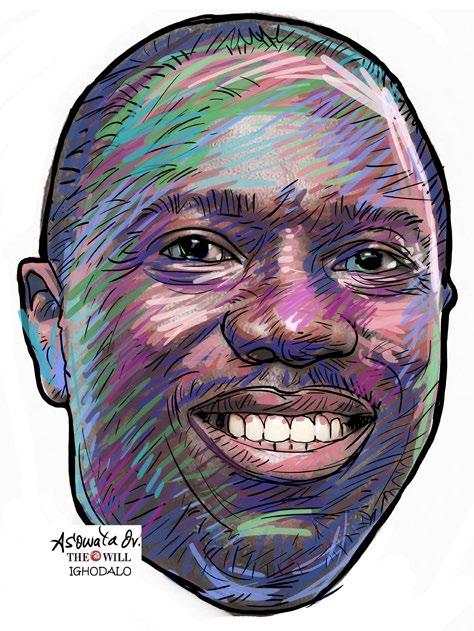

We have seen destruction at party rallies. These pre-election signs clearly demonstrate that the political actors are not preparing for elections on September 21, they are preparing for a showdown. They are preparing for war
The APC, at a press conference organised by its State Chairman, Jaret Tenebe, on Thursday, said it was not disposed to signing the Peace Accord because of the failure of the police to arrest the suspects named in the killing of Inspector Akor Anuh, one of the security details attached to the APC governorship candidate, Senator Monday Okpebholo, on July 18, 2024, along Airport Road, Benin City and attacks on members of the party at a PDP campaign rally.
The PDP, in declining to sign the peace accord, said that its action was based on alleged partisan dispositions of the Nigeria Police Force.
Speaking to journalists at the venue of the peace accord parley chaired by Gen Abubakar, Aziegbemi said that despite the incidents, the police had decided to arrest his party members while those identified in the APC were roaming the streets of Edo freely.
In his remarks at the ceremony, Abubakar noted that Obaseki had on Wednesday raised the issues of police bias and set out some conditions to be met by the police before PDP could sign the accord.
He said: “I expected Dr Aziegbemi to have stated that before the committee and political parties rather than his outright refusal to sign the accord
“The PDP still had the opportunity of signing the peace accord by coming to Abuja to do so,” he added.
Meanwhile, women in their thousands on Thursday staged a massive protest in Benin City, the Edo State capital, to decry and condemn what they described as the incessant Police harassment of Edo people in an uneven-handed manner as the governorship poll draws near.
The protest is coming on the heels of the order given by the Inspector-General of Police, Kayode Egbetokun, for the

arraignment of the party supporters on trumped up charges in a remote Magistrate Court in Abuja, it was learnt. Following the loud outcry by Edo people over the indiscriminate arrest and unlawful detention of some members of the Peoples Democratic Party PDP in the state, ahead of the September 21 governorship election, the IGP gave the orders for the arraignment of the party supporters.
Reacting to the developments, Executive Director of YIAGA Africa, a civic hub for the promotion of democratic governance, Samson Itodo, raised the alarm over the potential of ‘war’ among the parties during the poll.
He said, “We have a rise in the activities of cult groups in the build-up to the election. We have seen attacks on political candidates and supporters. We have seen destruction at party rallies. These pre-election signs clearly demonstrate that the political actors are not preparing for elections on September 21, they are preparing for a showdown. They are preparing for war.”
He called on INEC and security agencies to “put the interest of the people first and on the political actors on both sides to put the interest of their state first and comply with the rules of the game.”



At any rate, Nigeria with a total police strength of 370,000 officers at 1:600 citizenpolice ratio, is under-policed and the Nigeria Police Force overstretched. Pulling almost 10 per cent of the force for an offseason election in a state in one week with a repetition of the exercise in another one month when the Ondo governorship poll will be due, is nothing but an exercise in diversion that ends up weakening its capacity to enforce law and order
At a time, the Federal Government underscored the seriousness of insecurity in the North-West geopolitical zone by deploying a combat outfit comprising security chiefs, top military brass led by Chief of Defence Staff, General Chris Musa, alongside the Minister of State for Defence, Bello Matawalle to Sokoto, comes this disturbing disclosure by Governor Dikko Radda of Katsina State.
Katsina is one of the seven states in that zone, alongside, Sokoto, Zamfara, Kebbi, Kaduna, Kano and Jigawa, that has been under severe attacks by bandits since the immediate past administration of Bello Masari.
According to the governor, only 32 police officers are patrolling one LGA in the state.
In an interview with DW Hausa Radio last week, Governor Radda said the LGA comprises 10 wards and over 200 villages and among the 32 officers policing the place, only nine guns are available, with just five operational. The governor did not name the local government for obvious security reasons. Yet Katsina State has known no respite from bandits for many months now. During Masari’s time, 10 out of the 34 local government areas were under attack and control of bandits.
In February this year, bandits reportedly killed Sanusi Hassan, the commander of the Katsina Community Watch Corps, seven watchmen and some residents in Kankara LGA.
In another attack, bandits killed six
people in Faskari LGA. In June, the police command in the state said gunmen killed about 20 people in the Gidan Bofa and Dan Nakwabo communities in Kankara LGA.
In July, bandits abducted about 26 people in Runka town, Safana LGA of the state. Remember Kankara LGA? That was the town where over 340 school children were kidnapped in 2020 and released one week after.
So, by his lamentation of the security situation, almost a fortnight after the recent deployment of a special security outfit to the North-West, the governor has raised a big question on the organisational structure and combat readiness of the security outfit. There is more.
Coincidentally, the Inspector-General of Police, Kayode Egbetokun, last Wednesday added a dimension that paints a picture of the depth of official seriousness with insecurity in the country. The IGP stated that the police will deploy 35,000 personnel to complement 8,000 soldiers and other security agencies for this weekend's governorship election in Edo State. This sharp contrast in allocation of personnel is telling and indicative of how the authorities prioritise security matters in Nigeria.
Doubtless, insecurity is pervasive during elections, what with thuggery, ballot box snatching, voter intimidation, bribery and other criminal acts that have consistently characterised virtually all elections held in the country since the return to civil rule in 1999. But this is often due to the elitism surrounding the conduct of elections in the country, right from voting, declaration of results, contestation of results and adjudication
by the courts.
At any rate, Nigeria with a total police strength of 370,000 officers at 1:600 citizen-police ratio, is under-policed and the Nigeria Police Force overstretched. Pulling almost 10 per cent of the force for an off-season election in a state in one week with a repetition of the exercise in another one month when the Ondo governorship poll will be due, is nothing but an exercise in diversion that ends up weakening its capacity to enforce law and order.
This is so because past experience shows that many of the policemen on duty during elections are ill-equipped to effectively deal with the security challenges posed by desperate politicians and their hirelings. Many policemen have been reported, particularly during the 2023 general election, to lack walkie-talkies to call for back-up in the event of an outbreak of violence, while some of them helpless look the other way when overwhelmed by sponsored attacks by politically exposed persons.
The point is that the governing elite must get its priority right in the management of the affairs of this country. This is the powerful message that this contrast in Governor Rada’s lamentation and IGP Egbetokun’s disclosure shows.
How it was possible for the authorities to deploy 30,000 policemen, 8,000 soldiers and other paramilitary forces in immediate response to areas of persistent kidnapping like in Southern Kaduna, Zamfara and some other similarly troubled spots in the country, more lives would have been saved from kidnappers and the message of deterrence sent to the daredevils.


BY OLUFEMI SONEYE
In the face of the challenges in the oil sector, particularly the current tightness in the supply of petrol, it has become fashionable to blame the national oil company, the Nigerian National Petroleum Company Ltd (NNPCL) for everything. Last week, it was Prof Pat Utomi who railed and fumed at NNPCL, calling it one of the most opaque and unreliable companies in the world. Before then, The Punch had published an editorial in which it described the NNPCL as a danger to Nigeria.

APART FROM DEEPENING ITS COMMITMENT TO ACCOUNTABILITY AND TRANSPARENCY BY REGULARLY PUBLISHING ITS AUDITED ANNUAL FINANCIAL STATEMENTS, THE NNPCL HAS BECOME A PROFITABLE COMPANY WITH AN UNDISPUTABLE GROWTH TRAJECTORY
The latest of these vitriolic attacks is by Dr Muiz Banire, a Senior Advocate of Nigeria (SAN) and former Commissioner of Transport and Environment in Lagos State, who contended in his column in The Sun that NNPCL is the black hole of Nigeria. Considering all that is going on in the petroleum sector, it would appear justifiable to call out the NNPCL as some people have been doing in recent times. But most of the diatribes have been based on sentiments that are not rooted in facts. Railing at the NNPC Ltd without a thorough understanding of the issues that threw up the current challenges in the oil sector, as most commentators have been doing, will yield no good for the country. At this critical intersection, the task for all well-meaning Nigerians should be how to find lasting solutions to the mischievousness in the oil sector and not to look for scapegoats, as Dr Banire has done. According to Banire, Nigeria has been experiencing fuel scarcity since 1973 on the back of fuel subsidy and the NNPCL is responsible for it. The assertion that the NNPCL is responsible for this state of affairs is moot. The policy of fuel subsidy is not the preserve of the NNPCL. Various administrations over the years have thought it wise to subsidise the cost of petroleum products for citizens.
They came up with different methods of doing that. The role of NNPCL has been to implement the policy as decided by the Federal Government. At a point, when government felt that the fuel subsidy policy had become a burden that should be done away with, they made it known to the people. NNPCL, as the national oil company, implemented it. This was the case in 2014 when the nation went up in protest against the decision to remove fuel subsidy. The same scenario repeated itself in 2019 when
the then Muhammadu Buhari administration came up with the policy to remove fuel subsidy. NNPCL is neither responsible for the policy of fuel subsidy or its removal. It is very unfortunate that Dr Banire would descend to the level of castigating it for the fuel subsidy debacle that has plagued Nigeria and on the basis of that label the company that has over the years patriotically borne the brunt of the fuel subsidy policy as a black hole.
Banire’s analysis fails to take into consideration the huge challenges of products smuggling, pipeline vandalism and crude oil theft that the company contends with daily. Barely three months after the Federal Government announced the removal of fuel subsidy, it became difficult for both major and independent petroleum products marketers to import petrol because of the foreign exchange policy. They could not source forex to continue to bring in petrol. Since then, NNPCL has been importing the product and selling at almost half price in keeping with the provisions of the Petroleum Industry Act (PIA), which designates it as the fuel supplier of last resort.
There have been supply hiccups here and there because of the financial constraints imposed by the transaction. Just imagine the hardship the nation would have suffered if the NNPCL was not there to play the role of supplier of last resort! NNPCL is the reason Nigerians continue to enjoy lower pump prices for petrol than they would ordinarily pay for the product. How then does such a company become a black hole? For Banire, NNPCL is responsible for everything that is wrong in the oil sector. He even blames smuggling and the unauthorised sale of petroleum products to street urchins who in turn trade it in the black market in jerry cans on the NNPC Ltd.
But does he have proof that unpatriotic marketers who divert petroleum products meant for local consumption to neighbouring countries are NNPCL staff or representatives of the company? Does he have any shred of evidence that the boys who sell fuel in the black market in jerrycans source their products from NNPCL retail stations? The least one would expect from a lawyer of Banire’s standing is a fact-based and not speculative commentary.
The NNPC Ltd has turned a corner since 2018 when it began to prepare for the enactment of the Petroleum Industry Act, which was eventually passed into law in 2021. Apart from deepening its commitment to accountability and transparency by regularly publishing its audited annual financial statements, the NNPCL has become a profitable company with an undisputable growth trajectory. The company recorded an unprecedented N3.29 trillion profit in its recently released 2023 audited financial report. But this fact is conveniently lost on Banire who insists that he has not seen any difference between NNPC as a corporation and the commercially focused NNPC Limited that was incorporated in 2021. Fortunately, it does not take Banire to see or believe that NNPCL, as presently constituted, has broken away from its debilitating past for it to be true. He is at home with the legal maxim: “Res Ipsa Loquitur”, meaning the facts speak for themselves.
*Continues online at www. thewillnews.com
BY ABIODUN KOMOLAFE
Nigeria is at the moment, in a precarious position, teetering like a heavy toddler due to the instability of its monocrop economy. The country’s heavy dependence on crude (not even refined) petroleum exports exposes a cumulative effect of defective political economies and the complacency of the ruling elite “who have been trained as to how not to think”. It also reminds one of the stage-like observations of Robert Nester Marley, that “in the midst of water, the fool goes thirsty.”
Nigeria’s reliance on oil can be diversified, but the elite’s mindset stands in the way. A notable example is Mexico’s Acapulco, which transformed from an insignificant town to a luxurious tourist destination. In the 1940s, President Miguel Alemán Valdés spearheaded its transition into a worldclass resort town, showcasing Mexico’s natural beauty and culture. This earned Acapulco the nickname, ‘The Pearl of the Pacific’, and made it a popular destination for relaxation, culture and adventure. Today, Acapulco boasts stunning beaches, vibrant nightlife and a rich history, making it a hotspot for millionaires from Canada, the USA, Latin America and Europe.
Once upon a time in Mexico’s rich history, a visionary president adopted the role of the Chief Marketing Officer, transforming Acapulco into a thriving tourist destination and this has made it a major contributor to Mexico’s economy, with a notable impact on the country’s revenue. Given adequate development and security measures, Nigeria’s natural attractions like Obudu Cattle Ranch and Yankari Game Reserve, combined with vibrant cultural events like the Calabar Carnival, Argungu Fishing, Eyo, Ojude Oba and Udiroko also have the potential to become tourist hotspots. The failure to think critically has consequences. Nigeria’s inability to generate at least $5 billion in tourism revenue annually, despite the growing demand for ecotourism, raises questions. For instance, why did Stevie Wonder, a renowned musician, choose to reside in East Legon in Accra, instead of Lekki in Lagos, Maitama in Abuja, or Eta Agbor Layout in Calabar? Consider also the recent presidential election, where governors met in hotels in Madrid, London, and Paris. Why not in Obudu or La Campagne Tropicana, to showcase Nigeria’s potential to international investors and sightseers?
A place like Tinapa Resort or Abraka Turf and Country Club would have been developed like Acapulco, attracting multinational hotel chains to build five-star hotels, Eco Lodges, Golf Courses and the like. Matter-of-factly, any sustainable inflow from tourism will generate local taxes, induce a positive multiplier effect and enable the country to begin to deal with its perennial current account deficits and balance of payment crises. That this is not so is a reflection of the warped mindset of the ruling elite across the board.
The reason Nigeria is not making it is the same reason it is not making it from solid minerals, agroallied exports and ‘invincible earnings’ from sectors such as the creative arts, information and communication technology (ICT) and ‘outsourcing’. The country possesses significant advantages, including its widespread use of English and high level of education. But then, the colonised mindset of Nigeria’s elite, evident in their preference for Dubai’s manufactured appeal over domestic tourism
development, has led to a neglect of the unique attractions of Obudu, Yankari and other domestic destinations, which remain underdeveloped and underappreciated.
SECURITY AND SAFETY CONCERNS, INCLUDING KIDNAPPING AND TERRORISM, CONTINUE TO DETER VISITORS FROM EXPLORING NIGERIA. AMONG OTHER CHALLENGES ARE INSUFFICIENT ACCOMMODATION OPTIONS, POOR ROADS AND INADEQUATE TRANSPORTATION NETWORKS. DESPITE ITS VAST POTENTIAL, FUNDING CONSTRAINTS HAVE ALSO IMPEDED THE SECTOR’S GROWTH
Take, for example, over a million Indians, are involved in outsourced jobs, bringing in billions of dollars a year into the Indian economy. They have leveraged their Englishspeaking skills, which is not as good as the English-speaking skills in Nigeria, to do so.
How many outsourced jobs have been created in Nigeria, compared to even Ghana, Kenya, Rwanda and the Republic of South Africa? Yet, Nigeria has the best human capital on the continent, actual and potential. The facts have been stated here! Indeed, it is a statement of the obvious to say that, without reworking a political economy that is an obstacle to production and creative thinking, the country will continue, very sadly, its slide into irrelevance.
Tourism in Nigeria offers a wide range of benefits, including positive social change, cultural exchange, community development and social cohesion. By facilitating crosscultural understanding, it fosters global citizenship, empowers local communities through entrepreneurship and skill development, and promotes national unity by bridging ethnic and religious divides. Tourism also drives economic growth and alleviates poverty and inequality by creating jobs, raising environmental awareness, and promoting conservation and peace. Through the sector, individuals can engage with diverse perspectives, challenge their assumptions, and develop a broader understanding of the world. Over and above all, it helps preserve Nigeria’s cultural heritage and cultivates national pride and patriotism. Obviously, reflecting on Nigeria’s current state can be disheartening.
*Continues online at www. thewillnews.com
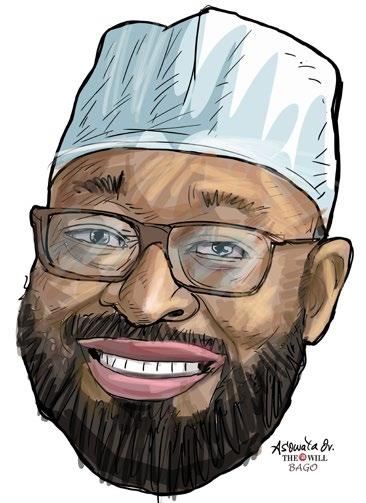
Nigeria’s export of agricultural products rose to N2 trillion in the first half of 2024, as the naira remained weakened since devaluation in June 2023. The value represents a 258.3 percent increase compared to N560.5 billion achieved in the equivalent period of 2023.
Data from the National Bureau of Statistics (NBS) showed that export of agric products valued at N973.69 billion in the review period was a decline of 5.93 percent over N1.035 trillion recorded in Q1 2024.
However, the figure represents an increase of 246.67 percent compared to N280.87 billion recorded in Q2 2023. The data showed that agricultural commodities exported to Asia were valued at N592.99 billion, followed by exports to Europe at N310.26 billion.
The NBS revealed in its ‘Foreign Trade in Goods Statistics’ report for Q2 2024 that export of agricultural products was dominated by ‘Superior quality cocoa beans’, with N268.92 billion, ‘Cashew nuts In shell’ valued at N209.80 billion, and ‘Standard quality cocoa beans’ with N107.27 billion.

The report further stated that ‘Superior quality cocoa beans’ worth N131.24 billion and N108.17 billion were exported to Malaysia and Netherlands, respectively; while ‘Cashew nuts in shell,’ worth N157.40 billion and N48.06 billion were exported to Vietnam, Soc Republic and India respectively.
Also, ‘Standard quality Cocoa beans’ worth N36.53 billion and N22.92 billion were exported to
Continues on page 16
EDITOR Sam Diala

BY SAM DIALA
Guaranty Trust Holding Company (GTCO) Plc is racing for a N20 trillion assets mark to consolidate grip on industry leadership ahead of the recapitalization exercise.
The Group’s audited half year (HY 2024) financial statements presented to the Nigerian Exchange on Wednesday, September 11, point to this direction.
The spruced up margins achieved by the Group showed in the impressive topline and bottom line growth which contributed to total assets soaring by 49.7 percent to N14.51 trillion, from N9.69 trillion as of December 31, 2023.
The healthy balance sheet position also mirrored through the expansion of loans and advances to customers from N2.48 trillion in HY 2023 to N3.1 trillion during the first six months of the year, showing a 25.4 percent rise. This is indicative of the Group’s diligent support to the economy despite prevailing headwinds. From this, it reaped a handsome net interest income of N491.55 billion in the first six months of the year against N177.45 billion recorded in HY 2023, constituting a 177 percent increase.
According to the audited financial results for HY 2024, this impressive performance reflected in the three-digit growth in gross earnings which surged by 107 percent to N1.39 trillion from N672,6 billion in the corresponding period of 2023.
The increase in gross earnings is largely due to growth in interest and non-interest income. The aggressive loan book expansion resulted in the increase in interest income to N607.69 billion against N214.45 billion in HY 2023 representing a jump of
183.37 percent.

The Group’s net interest income after loan impairment charges was equally in the positive trajectory rising by 370 percent to N444.1 billion from N94.49 billion in the equivalent period of the preceding year.
Similarly, non-interest income achieved a remarkable growth during the period on the back of fee and commission income which achieved a 95 percent growth to N113.91 billion against N58.41 billion in HY 2023.
This is driven largely by e-banking income which jumped to N32.50 billion from N21.21 billion in the previous year’s first six months resulting to a growth of 53.3 percent during the review period. This followed the bank’s pursuit of service excellence through its e-banking platforms amid intense industry competition.
Seeing the neck-break competition among industry peers, the Group accelerated its electronic transaction windows, such as the GT World and GT e-Tokin.
The move contributed to the remarkable improvement in earnings per share which shot from N9.94 to N32.12 representing a remarkable 263.3 percent growth.
THEWILL reports that GTCO recorded a substantial Profit Before Tax (PBT) of N1 trillion in the first six months of the year. The impressive half-year performance followed the record N494.5 billion posted in the second quarter (Q2) which is the
Continues on page 16
highest in the Group’s history.

Malaysia and Turkey, respectively.
The Group’s impressive results in HY 2024 will strengthen the performance towards achieving the target N400.5 billion set in the public offer programme
The figure also represents the best second-quarter results so far reported by any Nigerian financial holding company or bank following the blazing N509.3 billion PBT posted by the Group in Q1 2024.
Profit After Tax (PAT) for HY 2024 rose to N905.56 billion from N280.48 billion – a 222.86 percent growth.
“The Group’s impressive results in HY 2024 will strengthen the performance towards achieving the target N400.5 billion set in the public offer programme. This will expand the balance sheet as the financial services institution pursues the recapitalization goal,” said Clement Ulasi, a stock broker.
Ulasi added that a strong balance sheet is sine qua non for operating in the league of top financial service establishments that would emerge at the end of the recapitalization process.
Commenting on the significance of strong assets quality, Professor of Finance and Accounts at the Nasarawa State University, Keffi, Muhammad Mainoma, had told THEWILL that strong asset base is strategic to the development of any business because an enterprise is handicapped if it trades with a lean balance sheet.
“Strong asset base signifies that a business is strategically positioned to take advantage of its environment. For a bank, there is no time that people will not need money. Once a business is focused and invests in areas that people always need, it will not lose. This explains the continuous growth (in assets) despite the difficult operating environment,” Mainoma, former President, Association of National Accountants of Nigeria (ANAN), said.
GTCO recently concluded its public offer engagement meant to raise N400.5 billion to boost its capital base towards meeting the April 2026 deadline.
Commenting on the launch of the Public Offer in July, the Group Chief Executive Officer of Guaranty Trust Holding Company Plc, Segun Agbaje, said: “This equity capital raise is timely and marks a significant milestone in our strategic plan to pivot the organisation for transformational growth across the Banking businesses in and outside Nigeria, and the non-banking businesses; differentiating it as a leading Financial Services Group in Africa.”
“Over the last three years, we have diversified the earnings of the Group beyond pure banking play, through the creation of a Payments subsidiary and selective acquisitions in the Funds Management and Pension Fund Administration sectors; delivering exceptional value to our stakeholders whilst also enriching the lives of people in every community where we operate”.
GTCO is the most capitalised Banking stock on the Nigerian Stock Exchange and has consistently outperformed its peers in terms of key profitability indicators and other financial metrics.
Widely regarded as a first-rate financial institution, GTCO’s leadership in the Nigerian financial services industry and continuing efforts at empowering people and communities across Africa has earned it many prestigious awards over the years.
On the other hand, total imports of agricultural goods in
The first six months of 2024 rose to N1.81 trillion from N929.24 billion in the corresponding period of 2023 representing an increase of 95 percent.
Agric products imported in Q2, 2024 stood at N893.25 billion . This is a decrease of 2.96 percent when compared to the value of N920.54 billion recorded in Q1, 2024, and rose 96.38 percent when compared to N454.85 billion recorded in Q2, 2023.
According to the report, the major agricultural goods imported in Q2, 2024 included ‘Durum wheat’ from Poland valued at N155.32 billion and Lithuania with N76.89 billion. This was followed by ‘Blue whitings (Micromesistius poutassou, Micromesistius australis) meat, frozen.’ from Faroe Islands valued at N31.78 billion.
The NBS report further revealed that the total merchandise trade (exports and imports) in the first half of 2024 was N3.82 trillion compared to N1.48 trillion in the corresponding period of the preceding year, constituting an increase of 156.6 percent.
The transactions occurred on the heels of the devaluation of the naira in June 2023.
The Naira traded at N1,546.41 to the dollar on Friday, September, 13 – on the Nigerian Foreign Exchange Market (NAFEM) according to data from the FMDQ website - pointing to the massive depreciation of the local currency which traded at N471.67 to the dollar on June 13, 2023 before the devaluation of the naira on June 14, 2023.
Economics experts identify export boom as a major benefit of a weak currency as it encourages export against imports. Nigeria has witnessed significant trade surplus since the devaluation of the currency mid-June 2023
The country’s foreign trade statistics for the first quarter of 2024 revealed a record-breaking trade surplus of N6.52 trillion, a stunning reversal from the trade deficit of N1.41 trillion in the previous quarter (Q4 2023) and the N927.2 billion deficit in Q1 2023.
The NBS data indicates that total exports for Q1 2024 were valued at N19.17 trillion, a 51 percent increase from the previous quarter’s N12.69 trillion and a staggering 195.47 percent rise from N6.49 trillion recorded in Q1 2023.
Using the exchange rates of N1,309/$1 in March 2024, N907/$1 in December 2023, and N460/$1 in March 2023, exports amount to $14.6 billion, $13.4 billion, and $14.1 billion, respectively. Nigeria hasn’t seen trade figures this favourable in years, even if this is in Naira terms.
Imports rose from N6.4 trillion and N9 trillion in the first and last quarter of 2023 to N12.6 trillion in the first quarter of 2024.
As exports rose, imports also did but at a slower pace leaving the country with a robust balance of trade.
For the second quarter, the total trade surplus expanded by 6.5 percent quarter-on-quarter. It increased from N6.52 trillion in Q1 to N6.94 trillion in Q2 2024. Total exports stood at N19.41 trillion while total imports stood at N12.47 trillion in Q2 2024.
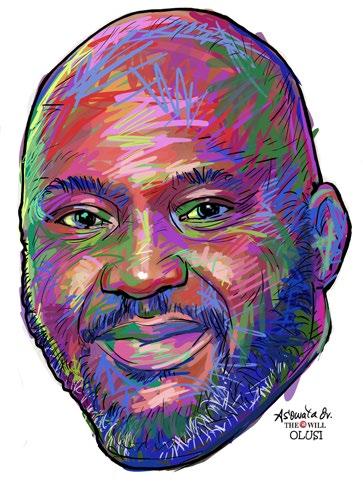
The Bank of Industry (BOI) has donated N3 billion to the Katsina State Government to boost local businesses in the state.
The donation was announced by the Katsina State Government via its official X (formerly Twitter) page on September 12, 2024. The state government described the donation as a “significant gesture” for the residents of Katsina State
In June 2024, the Bank of Industry disclosed via Instagram that it partnered with the Katsina State Government to launch a N5 billion Micro, Small, and Medium Enterprises (MSMEs) growth fund to enhance the state’s economic landscape. The deal was formalized through a Memorandum of Understanding (MOU) signed by the bank’s Executive Director, Corporate Services, Mr. Usen Efiong, and Katsina State Governor, Umar Radda Dikko.
As the bank stated at the time, “the N5 billion is made up of a N1 billion managed fund and a N4 billion matching fund, where BOI and the Katsina State Government are contributing N2
billion each.”
On Thursday, the government confirmed receiving a N3 billion cheque from the bank for the economic development of the state.
The governor emphasized that the MOU would stimulate economic development, create jobs, and boost the entrepreneurial ecosystem in the state.
“This significant gesture, in collaboration with the Katsina State Enterprise Development Agency (KASEDA), marks a major milestone in our journey towards fostering economic development and driving industrial growth in the state,” the governor said.
“This partnership will empower local businesses, create job opportunities, and enhance the overall economic landscape of Katsina,” the Katsina State Government tweeted.
The Bank of Industry Limited is Nigeria’s largest development finance institution. It is owned by the Ministry of Finance Incorporated, the Central Bank of Nigeria, and
private shareholders.
Its mission is to facilitate the transformation of Nigeria’s industrial sector by providing financial and advisory support for the establishment of large, medium, and small enterprises, as well as the expansion, diversification, rehabilitation, and modernization of existing enterprises. This commitment has driven BOI to continuously develop innovative strategies, interventions, and solutions to propel the Nigerian economy towards sustained growth. The Bank supports growth across various sectors, including Agro and Food Processing, Creative Industries, Engineering and Technology, Healthcare, Petrochemicals, Oil and Gas, Renewable Energy, and Solid Minerals. BOI operates with 30 state offices nationwide.
In 2023, President Bola Tinubu announced the appointment of Dr. Olasupo Olusi as the Managing Director and Chief Executive Officer of the Bank of Industry for an initial term of four years.


























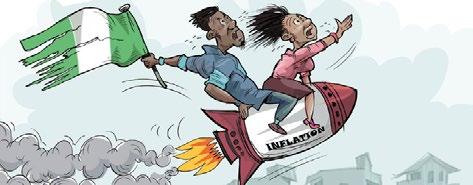































Depression and other mental health conditions often drive individuals down a dangerous path that ends with suicide, a major public health challenge. Suicide has been part of human history since ancient times, causing over 700,000 deaths annually and impacting individuals and communities globally. This is why rising cases of suicide call for urgent attention and collective action. In commemoration of World Suicide Prevention Day, which is observed globally on September 10, IVORY UKONU writes on celebrities who almost attempted suicide at some point in their lives.
Ubi Franklin

Music entrepreneur, Ubi Franklin once revealed that he almost committed suicide between July 2016 and March 2017 during his struggle with depression.
At that point, he was paying the mortgage on his house and even after completing payment, the urge to take his own life did not stop. Instead, it grew worse.
“I was so scared and all I kept saying and asking myself was ‘Who will take care of my son? I got home and started acting in a funny manner. My security guard had already turned on the power generator. I screamed at him to turn it off. I needed some peace and quiet. I was in that dark house all by myself and everything was falling part,” he recalled.

U

Comedienne and actress, Anita Asuoha, a.k.a Real Warri Pikin, also, nearly committed suicide over a debt of N22 million. She recalled how, while having a financial challenge, a motivational speaker who had an encounter with her husband convinced him to try several businesses. Spurred by the advice, she said her husband tried several ventures to pursue financial success, but the attempt landed the family into N22 million debt.
"I tried suicide in 2018, June 6, 3 pm to be precise. I attempted suicide, I gave up on life because the burden was too much. Life was hitting me left, right and centre and I felt the only way to escape was to end my life,” she recounted. She also revealed that she was taken to three different hospitals before she regained consciousness after attempting to take her life. She said the aftermath of her suicide attempt inspired her to venture into comedy, so she could use her story to help other people in her position to find healing.
nknown to many of her fans, erstwhile rapper, Modupe-Oreoluwa Olateru-Olagbegi, a.k.a Mo’Cheddah, had secret battles with depression and suicidal thoughts when she was fully involved in music.
The 34-year-old lifestyle content creator claims haters nearly drove her into committing suicide.
The plain truth was that some of her older colleagues despised and hated her for her talent. According to her, the bitterness was choking and felt even worse after she emerged winner of a Channel O music award.
She recalled never knowing what hatred felt like until she came into the music industry as she was really hated by her much older colleagues, especially after she won a Channel O music award.
“The industry was hostile. I would be performing and they would turn off my microphone because the A-list artist didn’t like me. I didn’t get it, I didn’t know there was hatred… I never knew how it felt to be hated so much. How do I meet a legend and I kneel down to say hi to her and she is like ‘Get off me.’ This was a woman I had looked up to for years. The industry was hostile. I felt as if I had failed, especially because I had thought that business would pick up. They had so much hate for me. They started bad-mouthing me to people, to companies and producers. So, I was kind of blacklisted. Nobody wanted to work with me because they hated me and they wanted to do everything in their power to ruin me and I felt God had forsaken me, sadness consumed me,” she recalled.
She revealed how she almost took her life, but had to stop because she knew her death would terribly affect her boyfriend, who is now her husband.
“At first, I didn’t know how to kill myself. I thought about it many times. I thought of drowning myself in the lagoon. I wanted my death to be quick. I prayed that God would just kill me,” she said.
N
ollywood actress, Adunni Ade, also contemplated suicide in the past. She revealed that she was so depressed when she left the father of her children that she thought of committing suicide. She said, “I think the major thing that got me through was the fear that somebody else would raise my children. That was the scariest thing for me, that my kids would see somebody else as their mother. Depression is no joke. A lot of people in this country don’t want to admit that depression is an illness. People don’t know the extent to which it affects the mind. A lot of people know this. I think God loves me enough to still keep me here."

Socialite and beauty entrepreneur, Farida Abdulkabir tried to commit suicide in 2023. Fortunately she was prevented from doing so by passersby on Third Mainland Bridge. Farida, who is the founder of House of Phreedah, a skincare company, had packed her Lexus SUV on the bridge and attempted to jump into the lagoon. She wanted to end it all after her less than three months luxury wedding, which she funded to the tune of N100 million, came crashing like a pack of badly arranged cards. Coupled with the fact that after the marriage collapsed, her estranged husband, Ademola Okulaja, an ex-convict and her off and on boyfriend began bad mouthing her with falsehood. This became too unbearable for her and she decided to end it all.





While celebrating her 31st birthday a few years ago, former rapper, Elohor Eva Alordiah, revealed how she suffered depression and almost took her own life. She said it took her a 'long walk' to get out of that feeling. From almost taking her own life, the 34 year-old now lives her life with a single mission to help others live theirs better.

Tunji Balogun, aka Teebillz, the estranged husband of music star, Tiwa Savage, has had to deal with mental illness from sufferring bouts of depression and even attempted suicide when his three-year marriage to the singer crashed. Shortly before his suicide attempt, he had gone on a media rant about how his estranged wife had cheated on him and how diabolical her mother is. Shortly after the social media meltdown, he tried to jump into the Lagos lagoon but was luckily, rescued by his friend, Bankole Wellington, a.k.a Banky W.
Media personality, Toke Makinwa who lost her biological parents in a fire accident once recounted how she attempted suicide after her marriage to fitness expert, Maje Ayida hit the rocks. According to her, she suffered from depression and lost hope of living. And while sitting in her bedroom one day, a very strong feeling of hopelessness overcame her, causing her to reach for a bottle of Dettol to drink, die and avoid the shame and ridicule of being married to a perennial cheat who fathered a child with one of his side-chics.

Controversial ex-Nollywood actress and aspiring politician, Tonto Dikeh, once attempted suicide and it was shortly after her ill-fated drama filled marriage to businessman, Olakunle Churchill hit the rocks. She claimed to have suffered from depression and almost took her life as a result of it. She recalled enrolling in a depression class to enable her to get out of the foul mood and learn to speak positively over her life.


Comedian and actor, Julius Agwu, who suffered from brain tumour disclosed that the experience after discovering he had the disease was not wonderful at all. After he discovered he had brain tumour, all he wanted to do was to commit suicide while he searched for the documents of his property to give to his wife as he prepared for death. Although he has since recovered from the disease, his marriage which produced two children has unfortunately broken down and his wife has since moved on.
Besides the fact that suicide is a sin in the sight of God, the Criminal Code Act in the South of Nigeria and the Penal Code in the North of Nigeria both regard those who attempt to end their own lives as offenders in the misdemeanour category. Section 327 of the Criminal Code states: “Any person who attempts to kill himself is guilty of misdemeanour and is liable to imprisonment for one year.”
Section 231 of the Penal Code states: “Whoever attempts to commit suicide and does any act towards the commission of such offence, shall be punished with imprisonment for a term which may extend to one year or with fine or with both”.
Suicide is preventable and below are practicable ways to prevent suicide:
• Encourage open conversations with people who aren't judgemental. It can reduce the stigma and help individuals seek support.
• Recognise warning signs like withdrawal, changes in behaviour, mood swings, or talking about feeling hopeless. Early detection can lead to timely intervention.
• Promote mental health education by spreading awareness about mental health issues and suicide prevention. Teach people how to manage stress and seek help when needed.
• Limit access to harmful tools that could be used for self-harm, such as firearms, medication, or toxic substances, to lower the risk of impulsive acts.
• Seek professional help through therapists and counsellors. Therapy and medication can help manage underlying issues like depression or anxiety.
• Stay connected to friends, family, or colleagues. Strong social connections provide emotional support and help one feel less alone.
• Stay healthy physically and mentally by indulging in healthy lifestyle choices, such as regular physical activity, balanced diets, adequate sleep, and mindfulness practices, which can improve overall mental health.
• Stay informed by continually learning about suicide prevention strategies and mental health resources. Education empowers one to take the right action when needed.
• Acknowledge the complexity of suicide and there may not be a clear answer or reason for why one feels the way he/she feels.
• Young people in particular should develop personal resilience like building life skills, improving self-esteem, developing problem-solving skills, embracing realistic optimism and even using spirituality.
#If you are feeling depressed or having suicidal thoughts, please seek help by contacting your doctor or call for help on 112. It is toll-free, 24/7.

Nneka Enwereji has been appointed as the new MD/CEO for Citibank Nigeria Limited (Citi) following an approval by the Central Bank of Nigeria, CBN. She succeeds Ireti Samuel-Ogbu who has retired from Citi after 36 years of service. Prior to her appointment, Enwereji was Citi’s Head of Global Network Banking (GNB) across the SSA sub-cluster, and she led the team in achieving record business growth, amidst considerable market complexities. Her previous roles include the GNB Co-Head for Middle East and Africa (MEA), Africa Trade Services Head and Financial Institutions SSA Trade Head. She brings a wealth of experience and her 31-year banking career spans Markets, Corporate & Investment Banking, Transaction Services, Risk Management and Operations. She has been an Executive Director on the Citi Nigeria board and has also served on different boards in a nonexecutive capacity. She holds a degree in Computer Science and Economics with first class honors from the Obafemi Awolowo University and an MBA from the Warwick Business School, U.K. She has also attended executive programs at Yale School of Management and University of California, Berkeley. Enwereji will be responsible for maximizing Citi’s value proposition to clients present in Nigeria by driving
Continued from page 18

innovation, enhancing customer satisfaction, and reinforcing Citi’s position as a market leader. She will ensure the bank remains consistent and steadfast in its commitment to serve as a bridge to Citi’s global clients with local presence, and local clients with global aspirations.
mutual friends to decide on which side of the divide to be, with regard to their birthday parties. A handful of them chose who to celebrate with, but THEWILL exclusively gathered that there was a lot of backdoor explanation and excuses by these mutual friends who found themselves thrust in an awkward position.

Continued from page 18

Mo kicked off her birthday celebration with a project that she unveiled in partnership with the US embassy in Nigeria. It is called ‘Lagos Canvas’. The project offers a platform for both seasoned and emerging creatives to shine. The unveiling was starstudded and Mo basked in the euphoria of being the centre of attraction. This was quickly followed by an intimate dinner, put together by some of her female friends to celebrate her inspiring journey and significant contributions to the entertainment industry.
Also, Senator Florence Ita-Giwa threw a mini bash to celebrate not only her landmark age, but also her courage, resilience and can-do spirit. The soiree which had only a few handpicked friends held at the Movenpick Hotel, Ikoyi, Lagos. The party continued on Wednesday, September 11 with another thanksgiving and lunch party.
To kick-start proceedings at this thanksgiving lunch party, was Pastor Ituah Ighodalo of Trinity House Church who gave a sermon and prayed for the celebrant before the actual dance party which had a lot of gospel music that got guests gyrating on the dance floor.

On the other hand, Marian, who runs a shoe business, BFF Shoes; a fashion boutique, Nicoles Boutique and Madison Jay Furniture also threw a stylish private party to mark her new age. Tiwa Savage and Oluwatobi Wande Ojosipe, a.k.a Wande Coal, performed some of their songs to the delight of the carefully handpicked guests. The former best friends became estranged over three years ago. Not many knew about the undercurrents between them until THEWILL exclusively reported that their centre could no longer hold again, particularly when Marian was conspicuously absent at Mo's 57th birthday party which coincided with the opening of her Chinese cuisine restaurant, Jinja. Months later, Marian made a social media post taking a dig at Mo saying, "Don't blame a clown for acting like a clown, blame yourself for going to the circus. I got wise, I ain't going to the circus no more. #lagosisfullofactors."
In the past, these two former best friends suffocated their social media followers with the 'uniqueness' of their friendship. Both shared a lot of things in common. Their first offsprings are married, they are both grandmothers and both are doing quite well in their respective endeavours. They supported each other and celebrated each other's milestones. But all that went with the wind. All efforts by their friends to get them to reconcile has proved abortive. Hopefully as they have both waltzed into the elderly age bracket, one can only hope that they find a way to genuine reconciliation.

Adamolekun
Nigerian-born Damola Adamolekun has taken over ownership of Red Lobster LLC, an American casual dining restaurant chain headquartered in Orlando, Florida with operations across most of the United States, including countries like Puerto Rico and Canada. Red Lobster, which has been experiencing a financial crunch fueled by a large debt load, executive turnover and losses, was on the verge of shuttering more than 50 of its locations throughout the US. The contents of almost the 50 locations, which included California, Florida, New York, etc, were being auctioned off with each auction winner receiving the entire contents of the location they bid for.
In May 2024, the seafood chain filed for bankruptcy. Years of mismanagement, inflation and competition led to more than $1 billion in debt and less than $30 million in cash on hand. But 35-year-old Adamolekun has stepped in and he is currently working his magic to prevent the brand from going under and overcome its looming business performance problems. Although the financial picture seems gloomy, Adamolekun, who got hired to inject life back into the chain, is certain that the future is bright.
A former Goldman Sachs investment banker, Adamolekun was singled out to turn around the fortunes of Red Lobster because of his previous experience at P.F. Chang, an Asianfusion restaurant chain where he was the first Black CEO who generated an estimated $1 billion in revenue for the restaurant. After roughly three years at P.F. Chang Adamolekun returned to investment firm, Paulson & Co, where he previously worked and later became Vice-President and founder after buying it for $700 million in 2019. While there, he played a critical role in the corporation, providing subsequent management of a number of the firm’s large investments. He was also a member of the board of directors of International Towers Hill Mines. Very much single, Adamolekun holds a bachelor’s degree in economics from Brown University and a Master of Business Administration from Harvard Business School.
cement importation, automobile spare parts importation, fertilizer production and ended up becoming a key player in Nigeria's fertiliser industry, banking, telecommunications, and aviation, all of which he runs under TAK Continental Limited. Besides being an entrepreneur, he has held leadership positions in several major Nigerian bluechip companies. Following the acquisition of Notore, he became the company's board Chairman. Etuh began his business career in commodity trading in northern Nigeria in the early 1980s, dealing in agricultural produce. He would later enter the fertilizer business, eventually becoming a major importer and distributor in Nigeria. His company TAK Continental Limited grew to be one of the largest fertilizer companies in Africa by the mid2000s. In 2007, he acquired the Funtua Fertilizer and Chemical Company. Etuh played a key role in Nigeria's Presidential Fertilizer Initiative under former President Muhammadu Buhari's
administration and became the inaugural president of the Fertilizers Producers and Suppliers Association of Nigeria (FEPSAN). In 2014, Etuh became the vice chairman and later, chairman in 2015. In 2021, Etuh was involved in Mafab Communications' successful bid for a 5G spectrum license in Nigeria. He later acquired a majority stake in 9mobile, becoming its largest shareholder and its chairman. He also briefly owned Associated Aviation in the late 2000s. Not much is known about Etuh’s current marital status which he jealously shields from the public, following the passing of his wife and mother of his four children, Jennifer Ramatu Etuh. Mrs Etuh passed away in 2020. A sucker for education, Etuh was a graduate of Public Administration from Ahmadu Bello University, Zaria. She obtained an MBA from the Business School of the Netherlands, Lagos Business School, the IESE Business School and the London Business School.

Aare Afe Babalola, founder of Afe Babalola University Ado-Ekiti (ABUAD), has bagged the Honorary Fellowship of King’s College, London, a respected college of the University of London. He was conferred with the Award at a colourful ceremony held at Afe Babalola University in Ekiti State. The Fellowship Award was conferred on him in recognition of his transformative contributions of the legal luminary to education and the society at large. The award may not be
unconnected to the huge philanthropic gesture which the legal luminary made to the institution in June 2023. He donated the sum of £10 million to the institution for the establishment of the Afe Babalola African Centre for Transnational Education in King’s College as part of his efforts to enable young Africans to have access to education and opportunities which they would otherwise not be able to have. At the time the donation was made, when converted at the official rate provided by the Central Bank of Nigeria, CBN, £10 million was over N5.6 billion in value. Many had berated him for wasting such a huge sum of money abroad when the educational system in Nigeria is in shambles. His daughter, film maker Bolanle Austen-Peters however defended him, describing the fund as a token. Babalola is also the recipient of an honorary Doctor of Law degree from the same university.
Photo Editor: Peace Udugba [08033050729]
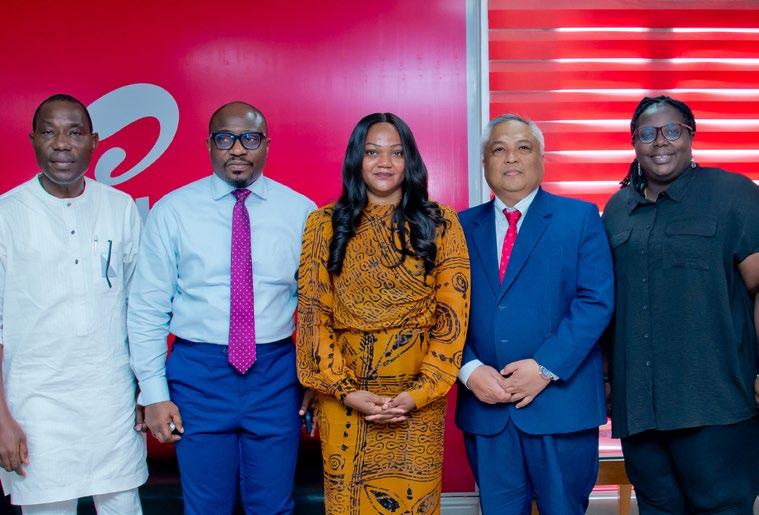
L-R: Director, Marketing, Airtel Nigeria, Ismail Adeshina; Director, Corporate Communications & Corporate Social Responsibility, Airtel Nigeria, Adefemi Adeniran; Director General/Chief Executive Officer, NIMC, Engr. Abisoye Coker-Odusote; Managing Director/Chief Executive Officer, Airtel Nigeria, Carl Cruz and Information Technology Director, Airtel Nigeria, Kemi Ariyo, during the courtesy visit of NIMC to Airtel Nigeria Headquarters in
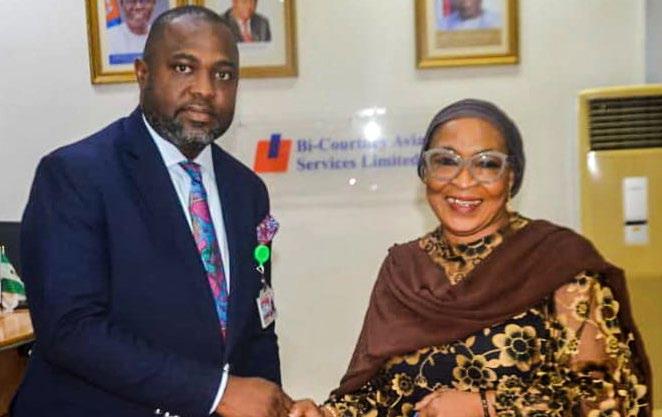
L-R: Acting Chief Operating Officer, Bi-Courtney Aviation Services Limited, (BASL), Remi Jibodu and Head of Editorial Operations, News Agency of Nigeria (NAN) Lagos, Ifenyinwa Omowole, during NAN delegation’s visit to (BASL) in Lagos on September 11, 2024.
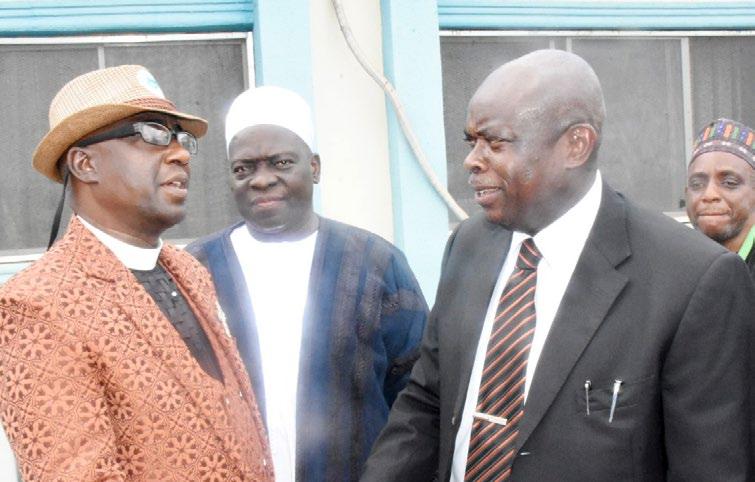
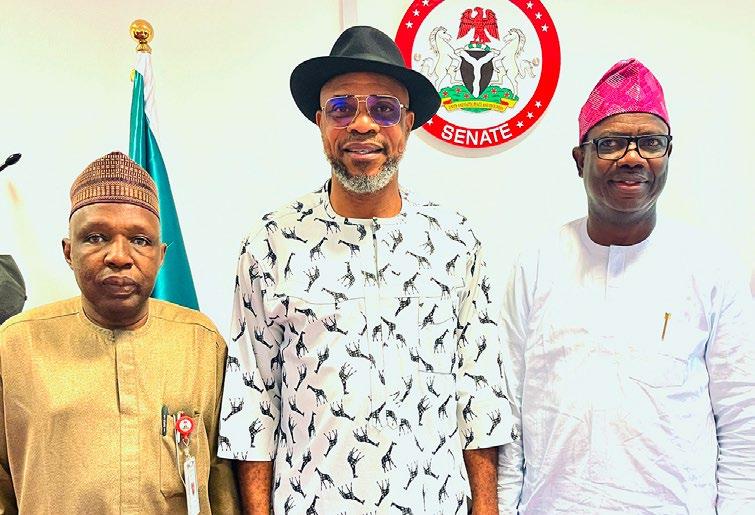
L-R: Director of Human Resources, National Commission for Colleges of Education (NCCE), Mr Dauda Yabani; Chairman Senate Committee on Federal Character and Inter-Governmental Affairs, Sen. Allwell Onyesoh and the Executive Secretary of NCCE, Prof. Paulinus Okwelle, during the senate committee’s review of the commission’s commitment to the implementation of the Federal Character principle at the National Assembly Complex in Abuja on September 11, 2024.
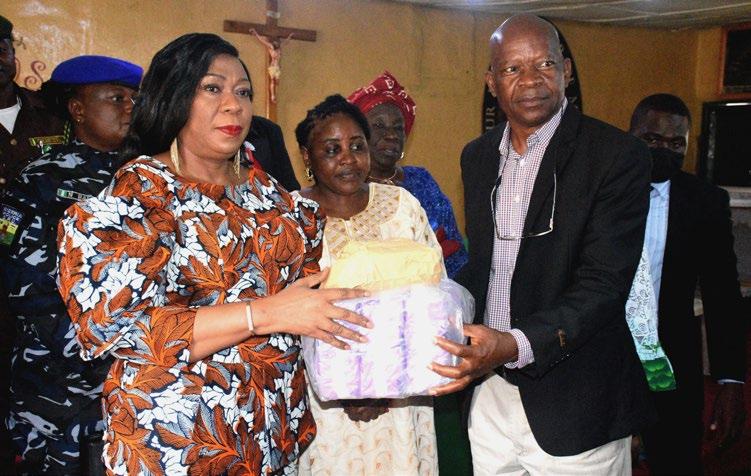
of
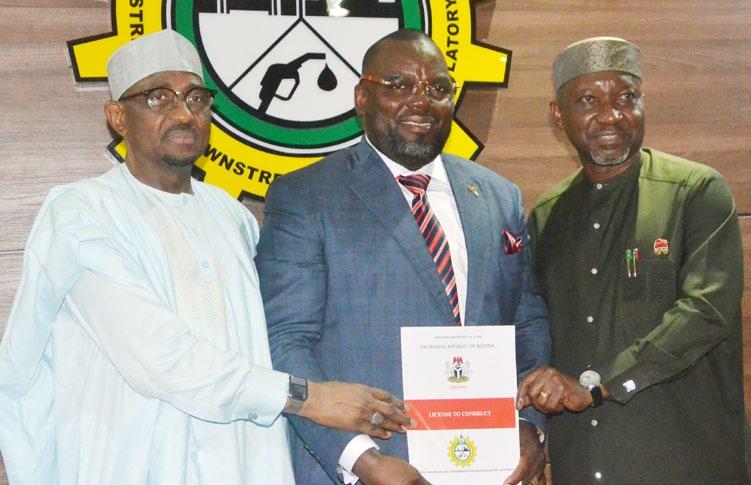
Chief Executive

and Downstream





BY JUDE OBAFEMI
Nigerian sports presents a striking contrast between the achievements of our Paralympians and the performance of Team Nigeria at the Olympic Games. A consistent pattern emerges: our para-athletes dominate their events and bring home impressive medal hauls, while our Olympic teams struggle to make an impact on the global stage.
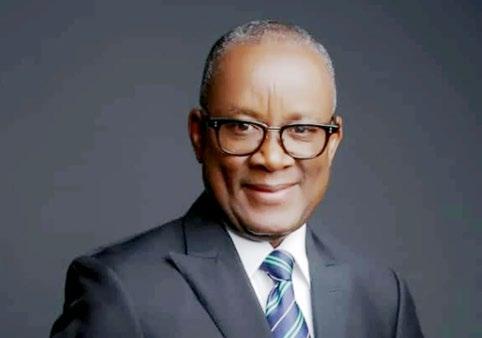
In contrast, the challenges facing Team Nigeria at the Olympics are multifaceted
recent 2024 Paris Olympics, Team Nigeria returned emptyhanded, failing to win a single medal. In stark contrast, our Paralympians shone at the same venue, returning home with a modest but impressive two gold, three silver, and two bronze medals, while finishing 40th on the overall medals table. This is not an isolated incident; Nigeria's Paralympians have a long history of success, amassing a total of 87 medals (42 gold, 21 silver, 23 bronze) since their debut at the 1992 Barcelona Games.
This paradox raises important questions: How have our Paralympians managed to excel consistently, even with limited resources, while our Olympic team continues to underperform? The answer lies in a combination of factors that have propelled our para-athletes to world record feats.
Nigeria's Paralympians have demonstrated remarkable specialisation, focusing their efforts on specific disciplines where they can truly excel. Take the case of Folashade Oluwafemiayo, the para-powerlifter who set a world record by lifting an astounding 166 kg, becoming the first para-athlete in history to achieve this feat. Similarly, Eniola Mariam Bolaji, an 18-year-old badminton player, made history by winning Nigeria's first-ever badminton medal at the Paralympics or Olympics. This laser-sharp focus on events where their key strengths lie has allowed our para-athletes to push the boundaries of their abilities and dominate their respective events.

The determination of Nigeria's Paralympians is truly inspiring. Despite facing immense challenges, including limited resources and societal stigma, these athletes have refused to be defined by their disabilities. Instead, they have channelled their energy into training, pushing their bodies and minds to the limit in pursuit of glory. Their triumphs serve as a powerful testament to the human spirit and the transformative power of sport.
The Paralympians have benefited from a level of international support that has eluded their Olympic counterparts. Organisations like the International Paralympic Committee (IPC) and various global partners have invested in the development of parasports, providing the necessary funding, equipment, and training resources to help these athletes reach their full potential. This support has been crucial in levelling the playing field and enabling Nigeria's Paralympians
to compete effectively on the global stage.
In contrast, the challenges facing Team Nigeria at the Olympics are multifaceted. The lack of focused specialisation in training programmes often results in athletes spreading themselves too thin across various disciplines. This diffusion of effort can lead to underperformance in competitions where peak performance in an area of one's key advantage is essential.
Moreover, systemic issues within sports governance in Nigeria, including inadequate funding, poor infrastructure, and inconsistent coaching, have stifled the potential of our Olympians. While there is no shortage of talent, the lack of structured support and development pathways has hampered their ability to compete effectively.
Continued From Page 24
This includes both technological solutions for monitoring environmental conditions and effective communication channels to disseminate warnings to at-risk populations.
Equally important is the need to bolster emergency preparedness. Local and national emergency response agencies need better funding, training, and equipment to handle large-scale disasters. This includes developing comprehensive evacuation plans for vulnerable areas. However, these efforts will be in vain if the root causes of infrastructure neglect, including corruption and mismanagement of funds, are not addressed. Strengthening oversight mechanisms and ensuring accountability at all levels of government is crucial to combat these systemic issues.
As extreme weather events become more frequent due to climate change, Nigeria must also integrate climate adaptation strategies into its urban planning and infrastructure development. This forward-thinking approach should be coupled with increased community engagement. Local communities should be involved in disaster preparedness planning and infrastructure maintenance to ensure sustainable, long-term solutions. By empowering communities with knowledge and resources, Nigeria can build a more resilient society capable of withstanding future challenges.
Furthermore, the government should consider establishing a dedicated infrastructure maintenance fund, with strict oversight to prevent misuse. This fund could ensure that critical structures like the Alau Dam receive regular inspections and necessary repairs, potentially averting future disasters. Additionally, Nigeria should seek international partnerships and expertise in disaster management and infrastructure development. Collaborating with countries that have successfully managed similar challenges could provide valuable insights and technical assistance.
I pray that we never experience this tragic incident again in our dear country. We have endured enough suffering and pain.
